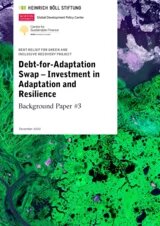Debt-For-Adaptation Swap – Investment in Adaptation and Resilience
Low-income countries (LICs) are suffering from triple distresses: the mortal impact of Covid-19, increasing debt burdens, and climate change impacts. Obviously, they are all suffering from a liquidity crunch because of competing national priorities. In the near term, adequate adaptation finance for climate-proofing development and enhancing the resilience of societies is not likely to be available. Therefore, this policy brief brings in the debt-for-adaptation swap as an alternative source that should be included in the global policy discourse. The long-term bilateral debt of the Paris Club members has been proposed as the best possible target for such swaps because of its potential for expedited dispensation through negotiations between the creditors and the debtors. In view of past experiences with small-scale debt-for-nature swaps, which could not make a dent in debt reduction, this proposal is about involving large sums in debt-for-adaptation swaps. Based on a review of past adaptation projects, some areas have been suggested for such investments. However, the success will depend on compli-ance with many conditions on both sides – the creditors and the debtors – the foremost being an agreed understanding and commitment: Creditors must see their responsibil-ity as a long-term programme of supporting adaptation in LICs with an appreciation that there are genuine global benefits from strengthening their economic and social resili-ence. The debtor nations must own the scheme, supported by enabling policy-institutional frameworks, including the establishment of an open, transparent, and ac-countable system of fiduciary management.
>> More about the „Debt Relief for Green and Inclusive Recovery“ initative
>> Find our Dossier about the DRGR-Project here
Product details
Table of contents
ContentsAbbreviations
Abstract
Executive Summary
1 Introduction
2 Review of the ECLAC Proposal on the Debt-for-Climate AdaptationSwap (DCAS)
3 Rationale of Selecting the LICs for the DAS
4 Potential Areas for Investment under DAS Programmes
4.1 Lessons learnt from adaptation projects
4.2 Areas for investment under DAS programmes
5 Conditions for Success in DAS Programmes – the Debtors and the Creditors
Conditions on the creditor side
6 Conclusions
References
Author’s Bio
